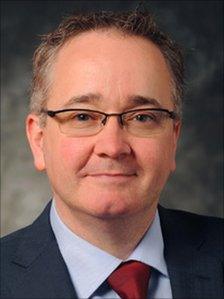Call to scrap council tax freeze
- Published

Gordon Matheson said council tax needed to rise to offset "brutal cuts"
The leader of Scotland's largest local authority is calling for an end to the freeze on council tax.
In a letter to Finance Secretary John Swinney, Glasgow City Council leader Gordon Matheson said the policy was unsustainable in the face of cuts.
He said without higher council tax, Glasgow would need to find £180m in savings over the next three years.
The Scottish government said it would "listen to views on how to deal with Westminster spending cuts".
Speaking on BBC Radio Scotland's Good Morning Scotland programme, he said: "Over the next three years, Glasgow is looking at having to save an estimated £180m from our budget.
"To give you a sense of what that means, that is the total annual revenue cost for roads, lighting, cleansing, parks and sports facilities and community halls within the city. So it's unprecedented.
"I'm calling for the option of being able to raise council tax in order to offset some of the more brutal cuts that we will have to make."
Mr Matheson, who is the first leader to propose scrapping the flagship policy, added: "Some of the choices that we are facing will have a pretty brutal impact on the communities that we serve, all of the households in Glasgow."
The city introduced a council tax freeze two years before the SNP government introduced it across the country.
As part of the concordat between councils and the Scottish government, authorities are rewarded financially for maintaining the freeze.
Mr Matheson said he still wants a share of the additional £70m given by the government and said it "would be vindictive" if ministers were to remove this.
"But we will still be reducing staff by around 15%, we will be expecting pay restraint, councillors pay for example is frozen for the next two years," he said.
"We are looking at a two-thirds reduction in our number of office spaces, we're stripping out middle management.
"We're looking for great efficiencies but we need to be able to have the option of comparing the impact of increasing the council tax with some of the more brutal options we face."
Options include boosting charges for care for the elderly, cancelling disabled play schemes and reducing the number of support teachers.
A 3% council tax increase - which he used as an example for Glasgow - would pay for an extra 200 teachers in the city.
Pat Watters, president of the Convention of Scottish Local Authorities (Cosla), backed Mr Matheson's call, adding: "I think he is absolutely right. It's something we have discussed."
Scotland's largest public sector union, Unison, also backed the call to raise council tax.
The union's Scottish organiser, Dave Watson, said: "Local authorities should be able to raise funds through the council tax.
"Using the tax system is much fairer than raising charges for services. Charges hit those on low incomes hardest and the council tax freeze benefits the wealthy disproportionately."
'Difficult times'
A spokesman for the Scottish government said: "The council tax freeze provides support for hard-pressed families during difficult times for household finances - and at a time when councils have received an increasing share of the resources available to the Scottish government.
"We will listen to views on how to deal with Westminster spending cuts as we consider the report of the Independent Budget Review, and feedback from around Scotland."
Meanwhile, Scottish Labour leader Iain Gray said councils had been pushed to the brink and accused the SNP of forcing "difficult choices" onto local authorities.
"The SNP tried to rig the council tax freeze for their own party political advantage but they always knew it was unsustainable and underfunded," he said.
"The underfunded freeze has already led to cuts in teachers and other services even before Scotland faces the onslaught on public services by the Tory-Lib Dem coalition."
- Published24 June 2010
- Published16 June 2010